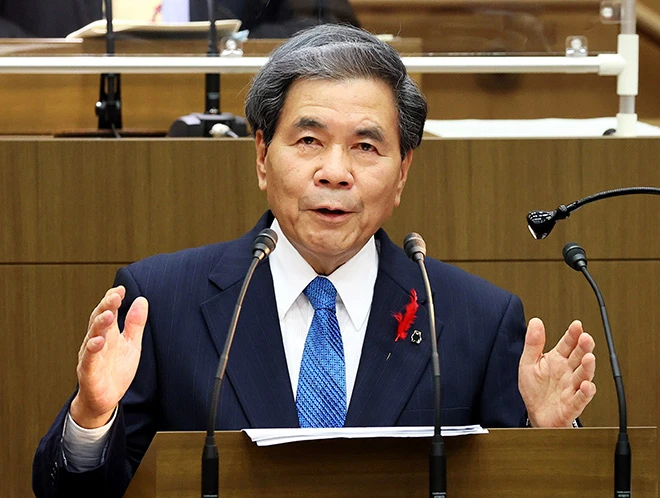
Kumamoto’s Governor is now wrapped up in a growing scandal. It’s all about the misuse of orchid flowers meant for a victory celebration. This issue is sparking a heated discussion on ethics and public duty.
The air is heavy with the scent of wrongdoing. People are debating its impact on culture and law.
The Blossoming Controversy: Kumamoto Governor’s Orchid Giveaway
In Japan, giving gifts in politics is a big deal. It’s part of both formal and informal events. But this tradition is hitting a snag with modern rules, especially the Public Offices Election Act. This law fights against illegal donations. The situation with the Kumamoto Governor and his orchids has sparked a conversation. It’s about the thin line between following tradition and fulfilling ethical duties.
The Tradition of Gift-Giving in Japanese Politics
Giving gifts, like flower arrangements, is a deep-rooted practice in Japanese politics tradition. Orchid flowers are highly valued in these traditions, celebrating major moments and achievements. However, there’s a strict rulebook that views these gestures as potentially illegal donations. This puts a beloved tradition in a tight spot with the law.
Public Offices Election Act and the Implications for Governor Kimura
The Public Offices Election Act watches over even the kindest gestures. It does so to block any shady forms of political gift-giving. This law emphasizes that public roles must be used wisely. Acts of kindness can unfortunately be seen as wrong. Governor Kimura’s orchid gifts, though meant well, might be seen as an underhanded way to win favor.
Understanding the Significance of Orchid Flowers in Japanese Culture
The elegant orchid holds deep meaning in Japanese culture. It is known for its beautiful looks and colors. It stands for luxury, respect, and admiration. This connects it to important events and achievements, like winning elections. Orchid flowers are more than just decorations. They show respect for someone’s achievements. This shows how much Japanese culture values nature and beauty.
Orchid Symbolism: From Celebration to Scandal
Orchid flowers usually mean success and honor. But the story of Governor Kimura adds a twist. This has made orchids a topic of political talk. It shows how these flowers can move from a sign of respect to a source of controversy.
Appreciation vs. Appropriation: The Interpretation of ‘Itadaita’
The custom of loving orchid flowers in Japan comes from ‘itadaita’. This word means thankful receipt of something. But, when the Governor gave out orchids, it meant more. It was like getting a heartfelt gift. This was especially true when these orchid flowers went to a hospital with ‘itadaita’ tied to them. It made the act seem like taking in a thoughtful present. This makes it hard to tell between truly valuing the gift and merely claiming it.
Dissecting the Ethical Dilemmas in Political Gift-Giving
Exploring ethical dilemmas in political gift-giving requires understanding a mixed zone of ethical politics and cultural norms. The story of Governor Kimura and the victory orchid flowers highlights a fine line. It shows the challenge of balancing thankfulness with ethical duties of political leaders.
The decision to distribute flowers touches on unclear boundaries influenced by culture. The Governor aimed to prevent waste, but giving away orchid flowers could look like seeking approval or boosting one’s image. This action raises eyebrows about true intentions behind such gestures.
- Orchids hold deep meaning in Japanese culture, making their political use delicate.
- Political leaders should prioritize ethics over personal gains or traditions.
- How actions are seen by others is as important as the intention behind them.
It’s important to find a middle ground between honoring culture and keeping ethical politics. Political figures need to be examples of transparent and ethical behavior. This is especially true when there’s a risk of ethical mistakes, even if actions are culturally accepted. Clear intentions and following legal rules should lead the way in ethical decisions.

When Politics Intersect with Horticulture: The Role of Tropical Orchids
Politics and horticulture blend interestingly when we look at tropical orchids. The recent story with Governor Kimura shows these plants are not just pretty. Beyond their looks, they carry deep political meanings. This section explores these unique plants and their link to political leadership.
Popular Orchid Varieties and Their Political Proxy
Some popular orchid varieties mean more in politics than in gardens. The Phalaenopsis orchid stands for purity, with its moth-like blooms. The sturdy Cymbidium represents strength and trust, key traits for leaders. These flowers’ meanings shed light on why they’re chosen for events and gift-giving.
How to Care for Orchids: An Allegory of Political Caretaking?
Caring for orchids and handling politics both demand precise care and honesty. Orchids’ delicate needs mirror the detailed work in politics. This similarity shows that both plants and governance thrive on careful nurturing and ethics. It tells us maintaining beauty and trust needs ongoing dedication.
- Phalaenopsis Orchids: A gesture of goodwill, akin to the clear integrity sought in public service.
- Cymbidium Orchids: Symbolizing fortitude, often aligning with the political ideals of strength and resilience.
- Dendrobium Orchids: With their diverse forms, they portray the agility and adaptability necessary in political advocacy.
Kumamoto’s Accountability Question: The Legal Perspective
The scandal in Kumamoto opens big questions about political accountability. It shows how hard it is to interpret cultural practices through legal rules. Grasping the Kumamoto legal perspective helps in understanding this complex case. Here, the issue is if public officials misused gifts, breaking moral and legal standards.
Talking about what could happen legally to a public figure for wrong use of gifts is complex. It’s important to tell if it was an attempt to avoid laws for fairness and accountability. Was it a clash between old traditions and today’s legal rules?
- Assessment of intent behind the distribution of orchid gifts
- Impact on public perception and trust in political figures
- Application of the Public Offices Election Act to cultural practices
- Potential for precedent-setting legal outcomes and guidelines
To understand the legal consequences of the orchid gifts, we need to look into laws, past cases, and Japan’s cultural roots. If Governor Kimura’s actions are seen as a minor mistake or intentional ethical breach will test political accountability. It also checks how much cultural expression is allowed in politics.
Conclusion
The flower scandal with Governor Takashi Kimura of Kumamoto has caught everyone’s attention. It has become a big part of discussions about politics and culture. The main issue is the clash between the Governor’s goal to share culture and be eco-friendly, and the criticisms about possible legal and ethical issues. This situation shines a light on the tough balance between following tradition and being accountable in politics.
People are still debating the political impact of Governor Kimura’s action with the orchid flowers. This debate isn’t just about his career. It also questions the usual expectations from politicians and their gifts. What will happen to Governor Kimura is still uncertain. Everyone is watching how the law and public opinion will influence his role in politics.
There’s also a need to think about the cultural aspects of this case. The orchid flower, a sign of respect in Japanese culture, has become a symbol of the conflict between right behavior and tendency. As we wait for a clear solution, this issue makes us think about how gifts are given in politics in Japan. It highlights the ongoing need for clear laws. These laws should honor traditions yet uphold the principles of legal and ethical governance.
Source Links
- https://soranews24.com/2024/05/07/kumamoto-governor-embroiled-in-flower-scandal/
- https://newbloommag.net/news/
- https://www.yumpu.com/en/document/view/18841980/15bn-projects-at-sohar-port-oman-observer
What is the orchid flowers scandal involving the Kumamoto Governor about?
The orchid flowers scandal involves allegations of misconduct by the Kumamoto Governor regarding the receipt and handling of expensive orchid flowers as gifts.
What are the specific allegations against the Kumamoto Governor in this scandal?
The specific allegations include receiving high-value orchid flowers as gifts from individuals or organizations with vested interests in government contracts or favors.
When did the orchid flowers scandal come to light?
The scandal came to light when reports surfaced in the media regarding suspicious gifts of orchid flowers to the Kumamoto Governor and potential connections to government dealings.
What is the significance of orchid flowers in this scandal?
Orchid flowers are often considered luxury gifts and can carry significant symbolic value. In this scandal, the expensive nature of the orchids raises questions about potential bribery or corruption.
What is the current status of the investigation into the orchid flowers scandal?
The investigation into the orchid flowers scandal is ongoing, with authorities examining evidence, conducting interviews, and gathering information to determine the extent of any wrongdoing.
Has the Kumamoto Governor responded to the allegations?
The Kumamoto Governor has denied any wrongdoing and stated that the orchid flowers were received as innocent gifts with no ulterior motives.
What are the potential consequences for the Kumamoto Governor if the allegations are proven true?
If the allegations are proven true, the Kumamoto Governor could face legal repercussions, including charges of corruption, bribery, or violations of ethics laws, as well as damage to their political career and reputation.
How has the orchid flowers scandal impacted public opinion in Kumamoto?
The scandal has led to public outcry and calls for transparency and accountability from government officials. It has also raised concerns about ethical standards and integrity in politics.
Are there any other individuals or organizations implicated in the orchid flowers scandal?
The investigation may involve other individuals or organizations connected to the gift-giving of orchid flowers, depending on the findings and evidence uncovered.
What steps are being taken to address corruption and improve transparency in Kumamoto’s government?
In response to the scandal, measures may be implemented to strengthen oversight, improve accountability, and enhance ethics training for government officials to prevent similar incidents in the future.
